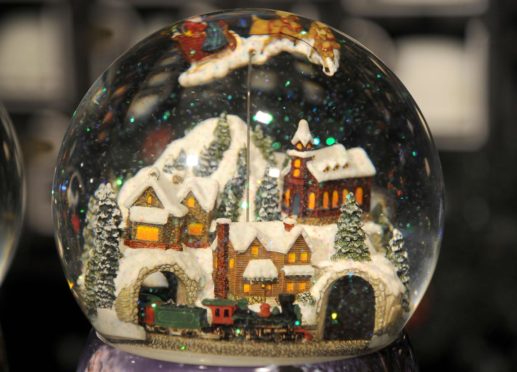As a child, I had a snow globe that seemed to me a magical world with its perfect winter scene: a village street with a church spire rising into a midnight blue sky, flakes of snow falling gently on miniature figures.
How did the water get sealed into that perfect bubble? I gazed into its depths and wanted to be there, to walk its streets and hear the village clock strike. But I was forever an outsider, an onlooker separated by glass.
This year, more than ever, we have been distanced from each other’s lives. For some, the isolation, coupled with redundancy, economic hardship, or ill health, has been hard to bear. Loneliness is a state of mind. We can be lonely on our own, lonely in a relationship, lonely in a crowd. But it is also a health risk. Linked to dementia, high blood pressure and heart disease, the effects of loneliness exceed the impact of obesity, with research suggesting it is the equivalent of smoking 15 cigarettes a day.
With the Christmas festivities behind us, we are looking ahead to the harsh realities of a new year: the ongoing fight against the pandemic and the attempts to hold back the tide of economic devastation. Those difficulties exacerbate people’s hopelessness.
But I have never forgotten the inspiring words about loneliness that came from BBC correspondent Alan Johnston after his release from captivity in Gaza in 2007. Kidnapped by the Army of Islam, he didn’t know if he would live or die. Yet he told himself he was luckier than someone in Auschwitz. Luckier than someone dying of cancer. “I told myself,” he said, “that in my captivity, there was only one thing that I might be able to control – my state of mind.”
When pulling someone out of a hole, the escape needs action by two people: both the rescuer and the rescued. Johnston’s words made me realise that the mind is the most powerful part of the human body. There were no bars, no walls, no keys that could fully capture a human being, no limits to their mind. There was a part of the human spirt that could be untouchable, unassailable, even when incarcerated. In the parts of my working life where I felt powerless and controlled, I realised there was an inner sanctum that could not be reached unless I gave access. That knowledge was strength.
So yes, we can help ourselves in the way we think but the point about Johnson’s strength was that it came partly from other people. In captivity, he was given a radio. He felt alone, but the World Service told him otherwise: 180,000 people had signed a petition for his release. He was not forgotten. Loneliness is not so much about being alone as feeling uncared for. Johnston learned he mattered. And all of us can make more effort to make someone feel they matter. A conversation, a phone call, an errand, a kindness; how little it costs.
True, there is an emotional risk in caring – for both parties at opposing ends of the safety rope. How often I have wanted to reach out to someone, but then hesitated. What if say the wrong thing? If I intrude? Perhaps safer to say nothing. Maybe I should cross the road… For the person who wants rescued, there is the ultimate mental obstacle: what if I am a burden? Perhaps I should not ask for help after all.
We all need to feel connected. At New Year, that need intensifies. Looking at the lit trees in other people’s windows; seeing the rich red displays of poinsettias and the family sized tubs of sweets in the supermarket; hearing the clink of other people’s Prosecco bottles: it can all be alienating when it reminds you there is nobody to share with. But sometimes we need to give ourselves permission to indulge for our own sake; to fill our time with things we want to do because we matter. And by reaching out, we open the door to allow others to see we matter too.
What about those of us lucky enough not to walk alone? Let’s make a pledge – either internally or through the P&J’s Connect at Christmas loneliness campaign – to make a difference. Take those small, emotional risks. Open up the seal on our personal snow globes so that others can enter the scene, hear the church clock chime, feel the flakes of snow fall on their upturned faces. Participants, not observers behind glass.
